Unit 7 Culture新编大学英语第二版第二册课文翻译
- 格式:doc
- 大小:51.00 KB
- 文档页数:8
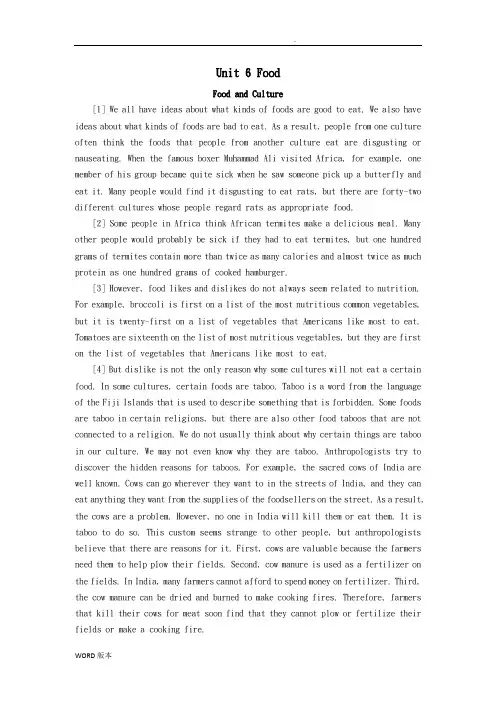
Unit 6 FoodFood and Culture[1] We all have ideas about what kinds of foods are good to eat. We also have ideas about what kinds of foods are bad to eat. As a result, people from one culture often think the foods that people from another culture eat are disgusting or nauseating. When the famous boxer Muhammad Ali visited Africa, for example, one member of his group became quite sick when he saw someone pick up a butterfly and eat it. Many people would find it disgusting to eat rats, but there are forty-two different cultures whose people regard rats as appropriate food.[2] Some people in Africa think African termites make a delicious meal. Many other people would probably be sick if they had to eat termites, but one hundred grams of termites contain more than twice as many calories and almost twice as much protein as one hundred grams of cooked hamburger.[3] However, food likes and dislikes do not always seem related to nutrition. For example, broccoli is first on a list of the most nutritious common vegetables, but it is twenty-first on a list of vegetables that Americans like most to eat. Tomatoes are sixteenth on the list of most nutritious vegetables, but they are first on the list of vegetables that Americans like most to eat.[4] But dislike is not the only reason why some cultures will not eat a certain food. In some cultures, certain foods are taboo. Taboo is a word from the language of the Fiji Islands that is used to describe something that is forbidden. Some foods are taboo in certain religions, but there are also other food taboos that are not connected to a religion. We do not usually think about why certain things are taboo in our culture. We may not even know why they are taboo. Anthropologists try to discover the hidden reasons for taboos. For example, the sacred cows of India are well known. Cows can go wherever they want to in the streets of India, and they can eat anything they want from the supplies of the foodsellers on the street. As a result, the cows are a problem. However, no one in India will kill them or eat them. It is taboo to do so. This custom seems strange to other people, but anthropologists believe that there are reasons for it. First, cows are valuable because the farmers need them to help plow their fields. Second, cow manure is used as a fertilizer on the fields. In India, many farmers cannot afford to spend money on fertilizer. Third, the cow manure can be dried and burned to make cooking fires. Therefore, farmers that kill their cows for meat soon find that they cannot plow or fertilize their fields or make a cooking fire.[5] Another example is that Americans do not eat dogs, although people from some other cultures regard them as good food. In the United States, dogs are very important to people as pets. They are usually regarded as part of the family, almost like a child in some cases. In addition, dogs have value as protection against criminals. Thieves will not usually enter a house where there is a dog because the dog will bark and possibly attack a stranger who is trying to get into a house. Apparently, the dog's place in society as a companion and as protection against criminals makes the dog taboo as food.[6] The taboo against eating pork occurs in more than one culture. There is some evidence that some ancient Egyptians did not eat pork. The ancient Israelites also regarded pork as taboo. One explanation for the pig-eating taboo is that pork that is not cooked sufficiently may spread a disease called trichinosis. However, most people no longer think that this is a good explanation for the pork taboo. Another explanation is that the Israelites were nomads—they were always moving from place to place. People have to stay in one place to raise pigs. The Israelites did not want to stay in one place because they did not want to change their culture. As a result, they did not eat pigs.[7] Anthropologists believe that most food likes and dislikes are a result of the ways of life of different people. Some people live in areas where there are both large animals and many insects. It is difficult for these people to kill large animals, and it requires a lot of energy. It is easier for them to use insects for food because it is not difficult to catch insects and it does not require a lot of energy. Nomadic people who move around will not want to keep pigs for food. People will not eat pets such as dogs. Americans eat a lot of beef because there is plenty of land for raising cattle and their meat can be shipped cheaply for long distances by railroads.饮食与文化1 对于什么样的食物好吃,我们都有自己的主见。
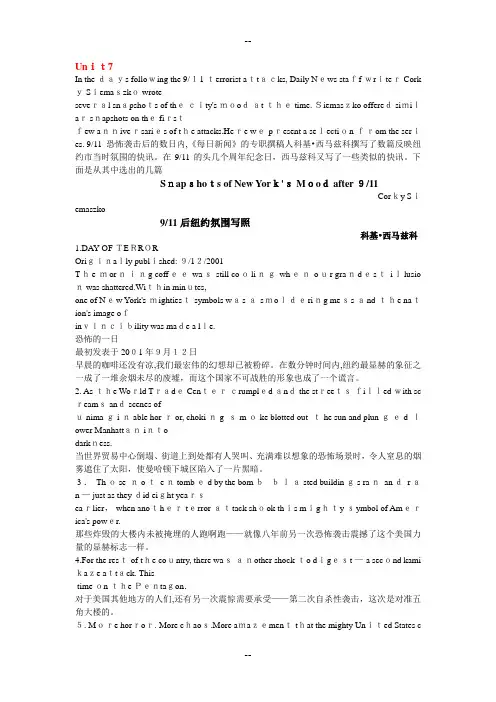
Unit7In the days following the 9/11 terrorist attacks, Daily News staff writer Cork y Siemaszko wroteseveral snapshots of thecity's moodat the time. Siemaszko offered similar snapshots on the firstfew anniversaries of the attacks.Here we present a selection from the series. 9/11恐怖袭击后的数日内,《每日新闻》的专职撰稿人科基•西马兹科撰写了数篇反映纽约市当时氛围的快讯。
在9/11的头几个周年纪念日,西马兹科又写了一些类似的快讯。
下面是从其中选出的几篇Snapshots of New York's Mood after 9/11Corky Siemaszko9/11后纽约氛围写照科基•西马兹科1.DAY OF TERROROriginally published: 9/12/2001The morning coffee was still cooling when our grandest illusio n was shattered.Within minutes,one of New York's mightiest symbols was a smoldering mess and the nation's image ofinvincibility was made a lie.恐怖的一日最初发表于2001年9月12日早晨的咖啡还没有凉,我们最宏伟的幻想却已被粉碎。
在数分钟时间内,纽约最显赫的象征之一成了一堆余烟未尽的废墟,而这个国家不可战胜的形象也成了一个谎言。
2. As the World Trade Centercrumpled and the streetsfilled with sc reams and scenes ofunimaginable horror, choking smoke blotted out the sun and plunged lower Manhattan intodarkness.当世界贸易中心倒塌、街道上到处都有人哭叫、充满难以想象的恐怖场景时,令人窒息的烟雾遮住了太阳,使曼哈顿下城区陷入了一片黑暗。
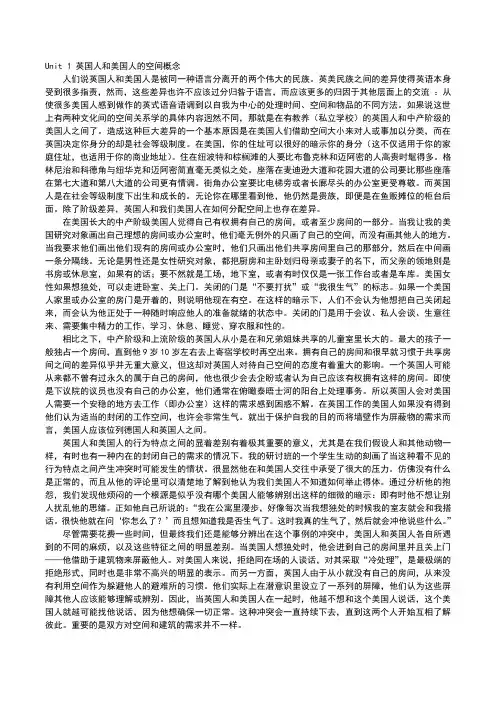
Unit 1 英国人和美国人的空间概念人们说英国人和美国人是被同一种语言分离开的两个伟大的民族。
英美民族之间的差异使得英语本身受到很多指责,然而,这些差异也许不应该过分归咎于语言,而应该更多的归因于其他层面上的交流:从使很多美国人感到做作的英式语音语调到以自我为中心的处理时间、空间和物品的不同方法。
如果说这世上有两种文化间的空间关系学的具体内容迥然不同,那就是在有教养(私立学校)的英国人和中产阶级的美国人之间了。
造成这种巨大差异的一个基本原因是在美国人们借助空间大小来对人或事加以分类,而在英国决定你身分的却是社会等级制度。
在美国,你的住址可以很好的暗示你的身分(这不仅适用于你的家庭住址,也适用于你的商业地址)。
住在纽波特和棕榈滩的人要比布鲁克林和迈阿密的人高贵时髦得多。
格林尼治和科德角与纽华克和迈阿密简直毫无类似之处。
座落在麦迪逊大道和花园大道的公司要比那些座落在第七大道和第八大道的公司更有情调。
街角办公室要比电梯旁或者长廊尽头的办公室更受尊敬。
而英国人是在社会等级制度下出生和成长的。
无论你在哪里看到他,他仍然是贵族,即便是在鱼贩摊位的柜台后面。
除了阶级差异,英国人和我们美国人在如何分配空间上也存在差异。
在美国长大的中产阶级美国人觉得自己有权拥有自己的房间,或者至少房间的一部分。
当我让我的美国研究对象画出自己理想的房间或办公室时,他们毫无例外的只画了自己的空间,而没有画其他人的地方。
当我要求他们画出他们现有的房间或办公室时,他们只画出他们共享房间里自己的那部分,然后在中间画一条分隔线。
无论是男性还是女性研究对象,都把厨房和主卧划归母亲或妻子的名下,而父亲的领地则是书房或休息室,如果有的话;要不然就是工场,地下室,或者有时仅仅是一张工作台或者是车库。
美国女性如果想独处,可以走进卧室、关上门。
关闭的门是“不要打扰”或“我很生气”的标志。
如果一个美国人家里或办公室的房门是开着的,则说明他现在有空。
在这样的暗示下,人们不会认为他想把自己关闭起来,而会认为他正处于一种随时响应他人的准备就绪的状态中。

第七课爱丑之欲几年前的一个冬日,我乘坐宾夕法尼亚铁路公司的一班快车离开匹兹堡,向东行驶一小时,穿越了威斯特摩兰县的煤城和钢都。
这是我熟悉的地方,无论是童年时期还是成年时期,我常常经过这一带。
但以前我从来没有感到这地方荒凉得这么可怕。
这儿正是工业化美国的心脏,是其最赚钱、最典型活动的中心,世界上最富裕、最伟大的国家的自豪和骄傲——然而这儿的景象却又丑陋得这样可怕,凄凉悲惨得这么令人无法忍受,以致人的抱负和壮志在这儿成了令人毛骨悚然的、令人沮丧的笑料。
这儿的财富多得无法计算,简直都无法想象——也是在这儿,人们的居住条件又是如此之糟,连那些流浪街头的野猫也为之害羞。
我说的不仅仅是脏。
钢铁城镇的脏是人们意料之中的事。
我指的是所看到的房子没有一幢不是丑陋得令人难受,畸形古怪得让人作呕的。
从东自由镇到格林斯堡,在这全长25英里的路上,从火车上看去,没有一幢房子不让人看了感到眼睛不舒服和难受。
有的房子糟得吓人,而这些房子竞还是一些最重要的建筑——教堂、商店、仓库等等。
人们惊愕地看着这些房子,就像是看见一个脸给子弹崩掉的人一样。
有的留在记忆里,甚至回忆起来也是可怕的:珍尼特西面的一所样子稀奇古怪的小教堂,就像一扇老虎窗贴在一面光秃秃的、似有麻风散鳞的山坡上;参加过国外战争的退伍军人总部,设在珍尼特过去不远的另一个凄凉的小镇上。
沿铁路线向东不远处的一座钢架,就像一个巨大的捕鼠器。
但我回忆里出现的三要还是一个总的印象——连绵不断的丑陋。
从匹兹堡到格林斯堡火车调车场,放眼望去,没有一幢像样的房子。
没有一幢不是歪歪扭扭的,没有一幢不是破破烂烂的。
尽管到处是林立的工厂,遍地弥漫着烟尘,这一地区的自然霉仟并不差。
就地形而论,这儿是一条狭窄的河谷,其中流淌着一道道发源自山间的深溪。
这儿的人口虽然稠密,但并无过分拥挤的迹象,即使在一些较大的城镇中,建筑方面也还大有发展的余地。
这儿很少见到有高密度排列的建筑楼群,几乎每一幢房屋,无论大小,其四周都还有剩余的空地。
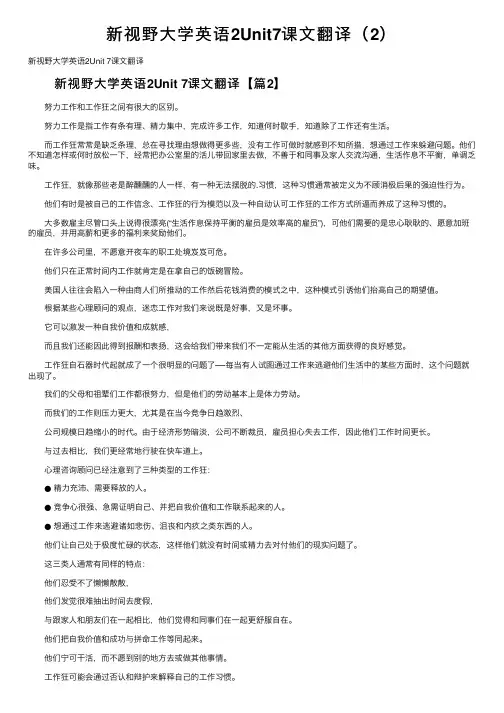
新视野⼤学英语2Unit7课⽂翻译(2)新视野⼤学英语2Unit 7课⽂翻译 新视野⼤学英语2Unit 7课⽂翻译【篇2】 努⼒⼯作和⼯作狂之间有很⼤的区别。
努⼒⼯作是指⼯作有条有理、精⼒集中,完成许多⼯作,知道何时歇⼿,知道除了⼯作还有⽣活。
⽽⼯作狂常常是缺乏条理,总在寻找理由想做得更多些,没有⼯作可做时就感到不知所措,想通过⼯作来躲避问题。
他们不知道怎样或何时放松⼀下,经常把办公室⾥的活⼉带回家⾥去做,不善于和同事及家⼈交流沟通,⽣活作息不平衡,单调乏味。
⼯作狂,就像那些⽼是醉醺醺的⼈⼀样,有⼀种⽆法摆脱的.习惯,这种习惯通常被定义为不顾消极后果的强迫性⾏为。
他们有时是被⾃⼰的⼯作信念、⼯作狂的⾏为模范以及⼀种⾃动认可⼯作狂的⼯作⽅式所逼⽽养成了这种习惯的。
⼤多数雇主尽管⼝头上说得很漂亮(“⽣活作息保持平衡的雇员是效率⾼的雇员”),可他们需要的是忠⼼耿耿的、愿意加班的雇员,并⽤⾼薪和更多的福利来奖励他们。
在许多公司⾥,不愿意开夜车的职⼯处境岌岌可危。
他们只在正常时间内⼯作就肯定是在拿⾃⼰的饭碗冒险。
美国⼈往往会陷⼊⼀种由商⼈们所推动的⼯作然后花钱消费的模式之中,这种模式引诱他们抬⾼⾃⼰的期望值。
根据某些⼼理顾问的观点,迷恋⼯作对我们来说既是好事,⼜是坏事。
它可以激发⼀种⾃我价值和成就感, ⽽且我们还能因此得到报酬和表扬,这会给我们带来我们不⼀定能从⽣活的其他⽅⾯获得的良好感觉。
⼯作狂⾃⽯器时代起就成了⼀个很明显的问题了──每当有⼈试图通过⼯作来逃避他们⽣活中的某些⽅⾯时,这个问题就出现了。
我们的⽗母和祖辈们⼯作都很努⼒,但是他们的劳动基本上是体⼒劳动。
⽽我们的⼯作则压⼒更⼤,尤其是在当今竞争⽇趋激烈、 公司规模⽇趋缩⼩的时代。
由于经济形势暗淡,公司不断裁员,雇员担⼼失去⼯作,因此他们⼯作时间更长。
与过去相⽐,我们更经常地⾏驶在快车道上。
⼼理咨询顾问已经注意到了三种类型的⼯作狂: ●精⼒充沛、需要释放的⼈。
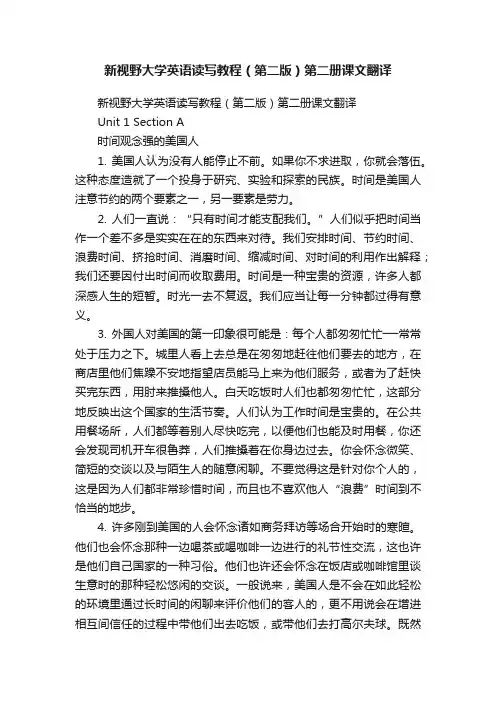
新视野大学英语读写教程(第二版)第二册课文翻译新视野大学英语读写教程(第二版)第二册课文翻译Unit 1 Section A时间观念强的美国人1. 美国人认为没有人能停止不前。
如果你不求进取,你就会落伍。
这种态度造就了一个投身于研究、实验和探索的民族。
时间是美国人注意节约的两个要素之一,另一要素是劳力。
2. 人们一直说:“只有时间才能支配我们。
”人们似乎把时间当作一个差不多是实实在在的东西来对待。
我们安排时间、节约时间、浪费时间、挤抢时间、消磨时间、缩减时间、对时间的利用作出解释;我们还要因付出时间而收取费用。
时间是一种宝贵的资源,许多人都深感人生的短暂。
时光一去不复返。
我们应当让每一分钟都过得有意义。
3. 外国人对美国的第一印象很可能是:每个人都匆匆忙忙──常常处于压力之下。
城里人看上去总是在匆匆地赶往他们要去的地方,在商店里他们焦躁不安地指望店员能马上来为他们服务,或者为了赶快买完东西,用肘来推搡他人。
白天吃饭时人们也都匆匆忙忙,这部分地反映出这个国家的生活节奏。
人们认为工作时间是宝贵的。
在公共用餐场所,人们都等着别人尽快吃完,以便他们也能及时用餐,你还会发现司机开车很鲁莽,人们推搡着在你身边过去。
你会怀念微笑、简短的交谈以及与陌生人的随意闲聊。
不要觉得这是针对你个人的,这是因为人们都非常珍惜时间,而且也不喜欢他人“浪费”时间到不恰当的地步。
4. 许多刚到美国的人会怀念诸如商务拜访等场合开始时的寒暄。
他们也会怀念那种一边喝茶或喝咖啡一边进行的礼节性交流,这也许是他们自己国家的一种习俗。
他们也许还会怀念在饭店或咖啡馆里谈生意时的那种轻松悠闲的交谈。
一般说来,美国人是不会在如此轻松的环境里通过长时间的闲聊来评价他们的客人的,更不用说会在增进相互间信任的过程中带他们出去吃饭,或带他们去打高尔夫球。
既然我们通常是通过工作而不是社交来评估和了解他人,我们就开门见山地谈正事。
因此,时间老是在我们心中滴滴答答地响着。
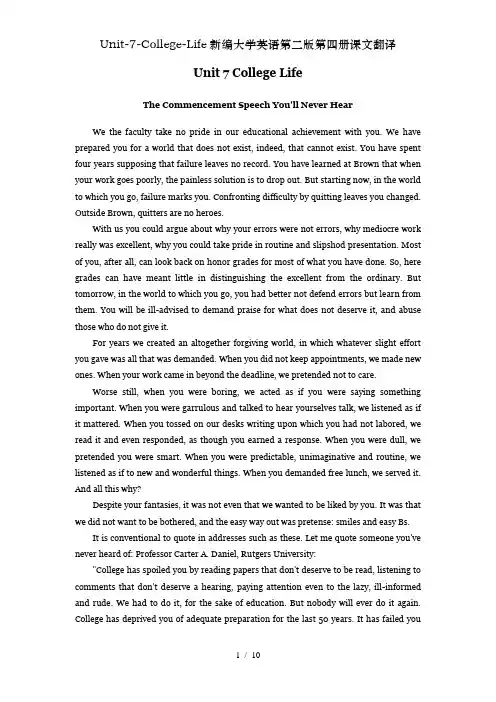
Unit 7 College LifeThe Commencement Speech You'll Never HearWe the faculty take no pride in our educational achievement with you. We have prepared you for a world that does not exist, indeed, that cannot exist. You have spent four years supposing that failure leaves no record. You have learned at Brown that when your work goes poorly, the painless solution is to drop out. But starting now, in the world to which you go, failure marks you. Confronting difficulty by quitting leaves you changed. Outside Brown, quitters are no heroes.With us you could argue about why your errors were not errors, why mediocre work really was excellent, why you could take pride in routine and slipshod presentation. Most of you, after all, can look back on honor grades for most of what you have done. So, here grades can have meant little in distinguishing the excellent from the ordinary. But tomorrow, in the world to which you go, you had better not defend errors but learn from them. You will be ill-advised to demand praise for what does not deserve it, and abuse those who do not give it.For years we created an altogether forgiving world, in which whatever slight effort you gave was all that was demanded. When you did not keep appointments, we made new ones. When your work came in beyond the deadline, we pretended not to care.Worse still, when you were boring, we acted as if you were saying something important. When you were garrulous and talked to hear yourselves talk, we listened as if it mattered. When you tossed on our desks writing upon which you had not labored, we read it and even responded, as though you earned a response. When you were dull, we pretended you were smart. When you were predictable, unimaginative and routine, we listened as if to new and wonderful things. When you demanded free lunch, we served it. And all this why?Despite your fantasies, it was not even that we wanted to be liked by you. It was that we did not want to be bothered, and the easy way out was pretense: smiles and easy Bs.It is conventional to quote in addresses such as these. Let me quote someone you've never heard of: Professor Carter A. Daniel, Rutgers University:"College has spoiled you by reading papers that don't deserve to be read, listening to comments that don't deserve a hearing, paying attention even to the lazy, ill-informed and rude. We had to do it, for the sake of education. But nobody will ever do it again. College has deprived you of adequate preparation for the last 50 years. It has failed youby being easy, free, forgiving, attentive, comfortable, interesting, unchallenging fun. Good luck tomorrow.That is why, on this commencement day, we have nothing in which to take much pride.Oh, yes, there is one more thing. Try not to act toward your co-workers and bosses as you have acted toward us. I mean, when they give you what you want but have not earned, don't abuse them, insult them, act out with them your parlous relationships with your parents. This too we have tolerated. It was, as I said, not to be liked. Few professors actually care whether or not they are liked by peer-paralyzed adolescents, fools so shallow as to imagine professors care not about education but about popularity. It was, again, to be rid of you. So go, unlearn the lies we taught you. To life!你将永远不会听到的毕业演讲1 我们这些教师对于在你们身上取得的教育成就一点都不感到自豪。
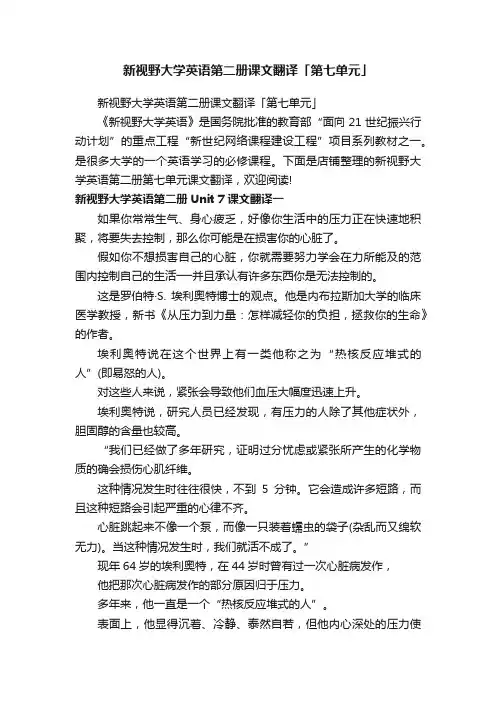
新视野大学英语第二册课文翻译「第七单元」新视野大学英语第二册课文翻译「第七单元」《新视野大学英语》是国务院批准的教育部“面向21世纪振兴行动计划”的重点工程“新世纪网络课程建设工程”项目系列教材之一。
是很多大学的一个英语学习的必修课程。
下面是店铺整理的新视野大学英语第二册第七单元课文翻译,欢迎阅读!新视野大学英语第二册Unit 7课文翻译一如果你常常生气、身心疲乏,好像你生活中的压力正在快速地积聚,将要失去控制,那么你可能是在损害你的心脏了。
假如你不想损害自己的心脏,你就需要努力学会在力所能及的范围内控制自己的生活──并且承认有许多东西你是无法控制的。
这是罗伯特·S. 埃利奥特博士的观点。
他是内布拉斯加大学的临床医学教授,新书《从压力到力量:怎样减轻你的负担,拯救你的生命》的作者。
埃利奥特说在这个世界上有一类他称之为“热核反应堆式的人”(即易怒的人)。
对这些人来说,紧张会导致他们血压大幅度迅速上升。
埃利奥特说,研究人员已经发现,有压力的人除了其他症状外,胆固醇的含量也较高。
“我们已经做了多年研究,证明过分忧虑或紧张所产生的化学物质的确会损伤心肌纤维。
这种情况发生时往往很快,不到5分钟。
它会造成许多短路,而且这种短路会引起严重的心律不齐。
心脏跳起来不像一个泵,而像一只装着蠕虫的袋子(杂乱而又绵软无力)。
当这种情况发生时,我们就活不成了。
”现年64岁的埃利奥特,在44岁时曾有过一次心脏病发作,他把那次心脏病发作的部分原因归于压力。
多年来,他一直是一个“热核反应堆式的人”。
表面上,他显得沉着、冷静、泰然自若,但他内心深处的压力使他筋疲力尽。
他现在身体状况很好。
他说,压力破坏性程度的主要预测指标是FUD因素──FUD指的是恐惧、犹豫和怀疑──再加上可察觉到的缺乏控制力。
对许多人来说,压力的根源是愤怒,而对付愤怒的诀窍是找出怒从何来。
埃利奥特问道:“这种愤怒是否来自这么一种感觉:希望一切事物都必须完美无缺?”“这在职业女性中是很常见的原因。
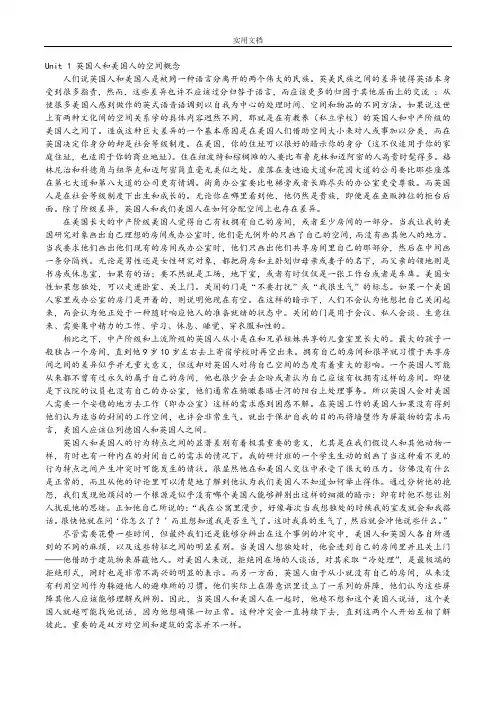
Unit 1 英国人和美国人的空间概念人们说英国人和美国人是被同一种语言分离开的两个伟大的民族。
英美民族之间的差异使得英语本身受到很多指责,然而,这些差异也许不应该过分归咎于语言,而应该更多的归因于其他层面上的交流:从使很多美国人感到做作的英式语音语调到以自我为中心的处理时间、空间和物品的不同方法。
如果说这世上有两种文化间的空间关系学的具体内容迥然不同,那就是在有教养(私立学校)的英国人和中产阶级的美国人之间了。
造成这种巨大差异的一个基本原因是在美国人们借助空间大小来对人或事加以分类,而在英国决定你身分的却是社会等级制度。
在美国,你的住址可以很好的暗示你的身分(这不仅适用于你的家庭住址,也适用于你的商业地址)。
住在纽波特和棕榈滩的人要比布鲁克林和迈阿密的人高贵时髦得多。
格林尼治和科德角与纽华克和迈阿密简直毫无类似之处。
座落在麦迪逊大道和花园大道的公司要比那些座落在第七大道和第八大道的公司更有情调。
街角办公室要比电梯旁或者长廊尽头的办公室更受尊敬。
而英国人是在社会等级制度下出生和成长的。
无论你在哪里看到他,他仍然是贵族,即便是在鱼贩摊位的柜台后面。
除了阶级差异,英国人和我们美国人在如何分配空间上也存在差异。
在美国长大的中产阶级美国人觉得自己有权拥有自己的房间,或者至少房间的一部分。
当我让我的美国研究对象画出自己理想的房间或办公室时,他们毫无例外的只画了自己的空间,而没有画其他人的地方。
当我要求他们画出他们现有的房间或办公室时,他们只画出他们共享房间里自己的那部分,然后在中间画一条分隔线。
无论是男性还是女性研究对象,都把厨房和主卧划归母亲或妻子的名下,而父亲的领地则是书房或休息室,如果有的话;要不然就是工场,地下室,或者有时仅仅是一张工作台或者是车库。
美国女性如果想独处,可以走进卧室、关上门。
关闭的门是“不要打扰”或“我很生气”的标志。
如果一个美国人家里或办公室的房门是开着的,则说明他现在有空。
在这样的暗示下,人们不会认为他想把自己关闭起来,而会认为他正处于一种随时响应他人的准备就绪的状态中。
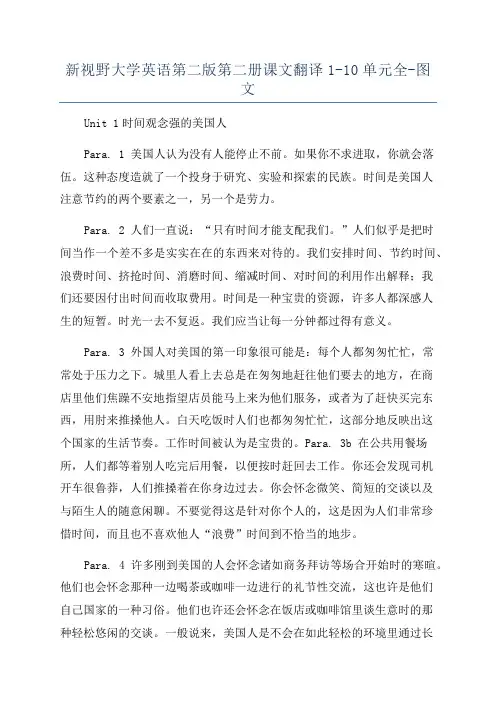
新视野大学英语第二版第二册课文翻译1-10单元全-图文Unit 1时间观念强的美国人Para. 1 美国人认为没有人能停止不前。
如果你不求进取,你就会落伍。
这种态度造就了一个投身于研究、实验和探索的民族。
时间是美国人注意节约的两个要素之一,另一个是劳力。
Para. 2 人们一直说:“只有时间才能支配我们。
”人们似乎是把时间当作一个差不多是实实在在的东西来对待的。
我们安排时间、节约时间、浪费时间、挤抢时间、消磨时间、缩减时间、对时间的利用作出解释;我们还要因付出时间而收取费用。
时间是一种宝贵的资源,许多人都深感人生的短暂。
时光一去不复返。
我们应当让每一分钟都过得有意义。
Para. 3 外国人对美国的第一印象很可能是:每个人都匆匆忙忙,常常处于压力之下。
城里人看上去总是在匆匆地赶往他们要去的地方,在商店里他们焦躁不安地指望店员能马上来为他们服务,或者为了赶快买完东西,用肘来推搡他人。
白天吃饭时人们也都匆匆忙忙,这部分地反映出这个国家的生活节奏。
工作时间被认为是宝贵的。
Para. 3b 在公共用餐场所,人们都等着别人吃完后用餐,以便按时赶回去工作。
你还会发现司机开车很鲁莽,人们推搡着在你身边过去。
你会怀念微笑、简短的交谈以及与陌生人的随意闲聊。
不要觉得这是针对你个人的,这是因为人们非常珍惜时间,而且也不喜欢他人“浪费”时间到不恰当的地步。
Para. 4 许多刚到美国的人会怀念诸如商务拜访等场合开始时的寒暄。
他们也会怀念那种一边喝茶或咖啡一边进行的礼节性交流,这也许是他们自己国家的一种习俗。
他们也许还会怀念在饭店或咖啡馆里谈生意时的那种轻松悠闲的交谈。
一般说来,美国人是不会在如此轻松的环境里通过长时间的闲聊来评价他们的客人的,更不用说会在增进相互间信任的过程中带他们出去吃饭,或带他们去打高尔夫球。
既然我们通常是通过工作而不是社交来评估和了解他人,我们就开门见山地谈正事。
因此,时间老是在我们心中的耳朵里滴滴答答地响着。
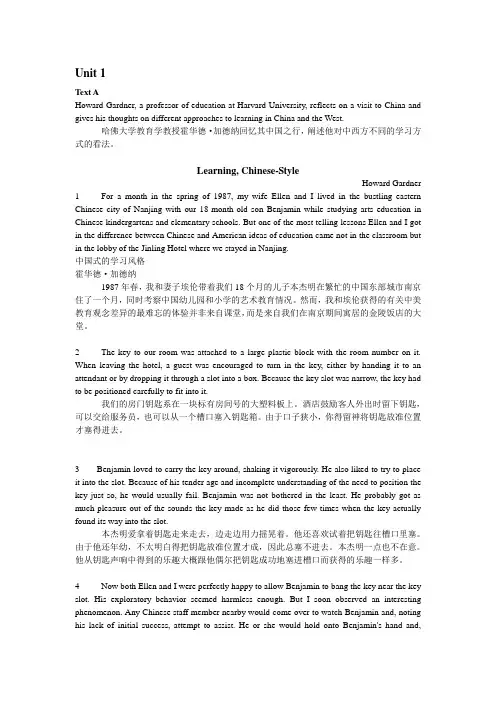
Unit 1Text AHoward Gardner, a professor of education at Harvard University, reflects on a visit to China and gives his thoughts on different approaches to learning in China and the West.哈佛大学教育学教授霍华德·加德纳回忆其中国之行,阐述他对中西方不同的学习方式的看法。
Learning, Chinese-StyleHoward Gardner 1 For a month in the spring of 1987, my wife Ellen and I lived in the bustling eastern Chinese city of Nanjing with our 18-month-old son Benjamin while studying arts education in Chinese kindergartens and elementary schools. But one of the most telling lessons Ellen and I got in the difference between Chinese and American ideas of education came not in the classroom but in the lobby of the Jinling Hotel where we stayed in Nanjing.中国式的学习风格霍华德·加德纳1987年春,我和妻子埃伦带着我们18个月的儿子本杰明在繁忙的中国东部城市南京住了一个月,同时考察中国幼儿园和小学的艺术教育情况。
然而,我和埃伦获得的有关中美教育观念差异的最难忘的体验并非来自课堂,而是来自我们在南京期间寓居的金陵饭店的大堂。
UNIT 1 One Writer’s Beginnings1 I learned from the age of two or three that any room in our house, at any time of day, was there to read in, or to be read to. My mother read to me. She’d read to me in the big bedroom in the mornings, when we were in her rocker together, which ticked in rhythm as we rocked, as though we had a cricket accompanying the story. She’d read to me in the dining room on winter afternoons in front of the coal fire, with our cuckoo clock ending the story with “Cuckoo,”and at night when I’d got in my own bed. I must have given her no peace. Sometimes she read to me in the kitchen while she sat churning, and the churning sobbed along with any story. It was my ambition to have her read to me while I churned; once she granted my wish, but she read off my story before I brought her butter. She was an expressive reader. When she was reading “Puss in Boots,” for instance, it was impossible not to know that she distrusted all cats.我从两三岁起就知道,家中随便在哪个房间里,白天无论在什么时间,都可以念书或听人念书。
Unit 1 Section A 时间观念强的美国人Para. 1 美国人认为没有人能停止不前。
如果你不求进取,你就会落伍。
这种态度造就了一个投身于研究、实验和探索的民族。
时间是美国人注意节约的两个要素之一,另一个是劳力。
Para. 2 人们一直说:“只有时间才能支配我们。
”人们似乎是把时间当作一个差不多是实实在在的东西来对待的。
我们安排时间、节约时间、浪费时间、挤抢时间、消磨时间、缩减时间、对时间的利用作出解释;我们还要因付出时间而收取费用。
时间是一种宝贵的资源,许多人都深感人生的短暂。
时光一去不复返。
我们应当让每一分钟都过得有意义。
Para. 3 外国人对美国的第一印象很可能是:每个人都匆匆忙忙——常常处于压力之下。
城里人看上去总是在匆匆地赶往他们要去的地方,在商店里他们焦躁不安地指望店员能马上来为他们服务,或者为了赶快买完东西,用肘来推搡他人。
白天吃饭时人们也都匆匆忙忙,这部分地反映出这个国家的生活节奏。
工作时间被认为是宝贵的。
Para. 3b 在公共用餐场所,人们都等着别人吃完后用餐,以便按时赶回去工作。
你还会发现司机开车很鲁莽,人们推搡着在你身边过去。
你会怀念微笑、简短的交谈以及与陌生人的随意闲聊。
不要觉得这是针对你个人的,这是因为人们非常珍惜时间,而且也不喜欢他人“浪费”时间到不恰当的地步。
Para. 4Para. 5Para. 6Para. 7差一些。
Para. 8Unit2Para. 1Para. 2Para. 3Para. 4手。
Para. 5 的确,后来我经历了无数痛苦的训练,还为此流了不少眼泪。
但在后来的五年里,我总能从尼克莱讲的有趣故事和他的幽默感中得到鼓励。
Para. 6 他开始总是说:“我的朋友们常去看电影,去跳舞,去和女孩子约会,”然后他会降低声音接着说:“我就在运动场上训练、训练、再训练。
第二年,我的15公里滑雪比赛成绩缩短了1.5分钟。
”Para. 7 “朋友们问我:‘尼克莱,你怎么做到的呢?’我回答:‘你们去看电影、跳舞、和女孩子约会,而我一直在训练、训练、再训练。
Unit 7 The Joy of TravelTransformative TravelTwenty-five years ago I felt like a wreck. Although I was just 23, my life already seemed over. The future appeared as much like a wasteland as the emptiness I could see while looking back to the past. I felt lost, without choices, without hope.I was stuck in a job I hated and trapped in an engagement with a woman I didn't love. At the time, both commitments seemed like a good idea, but I suppose it was the fantasy of being a successful, married businessman that appealed to me far more than the reality.I decided to take a class just for the entertainment value. It happened to be an introductory counseling course, one that involved personal sharing in the group. We were challenged to make commitments publicly about things we would like to change in our lives, and in a moment of pure impulsiveness, I declared that by the next class meeting I was going to quit my job and end my engagement.A few days later I found myself unemployed and unattached, excited by the freedom, yet terrified about what to do next. I needed some kind of transition from my old life to a new one, a sort of ritual that would help me to transform myself from one person into another. So I did something just as impulsive as my previous actions: I booked a trip for a week in Aruba.In spite of what others might have thought, I was not running away from something but to something. I wanted a clean break, and I knew I needed to get away from my usual environment and influences so as to think clearly about where I was headed.Once settled into my room on the little island of Aruba, I began my process of self-change. I really could have been anywhere as long as nobody could reach me by phone and I had the peace and quiet to think about what I wanted to do. I spent the mornings going for long walks on the beach, the afternoons sitting under my favorite tree, reading books and listening to tapes. Probably most important of all, I forced myself to get out of my room and go to meet people. Ordinarily shy, I now decided that I was someone who was perfectly capable of having a conversation with anyone I chose. Since nobody knew the "real" me, the way I had always been, I felt free to be completely different.It took me almost a year to pay off that trip, but I am convinced that my single week in Aruba was worth three years in therapy. That trip started a number of processes that helped me to transform myself. This is how I did it:I created a mindset that made me ready for change. I expected that big things wereon the horizon, that a trip such as this could change my life. I believed with all my heart that I could change, if only I could find a quiet place to sort things out and experiment with new ways of thinking and acting.I insulated myself from the usual influences in my life and the people whose approval was most important. One of the reasons that therapy often takes so long is that, once you leave the safety and support of a session, you reenter the world where familiar people elicit the familiar reactions. By separating myself from others' approval and influences, I was able to think more clearly about what I really wanted.I structured my time in order to produce change and growth. Solitude, isolation, or new environments in themselves are not enough; you must also complete tasks that are relaxing and educational. The most important part of any therapy is not what you understand or what you talk about, but what you do. Insight without action is entertaining but not always helpful. Instead of reading novels and calling home regularly, I took the time to participate in different activities that would make me change.I pushed myself to experiment with new ways of being. I sampled alternative lifestyles and pretended to be a different person. I acted in unfamiliar ways just to see how it felt. Whatever I would usually do in various circumstances, I forced myself to do the opposite. This reinforced the idea that anything was possible, that I could do anything I wanted.I made public commitments of what I intended to do so it would be harder to back down. There were times when I wanted to avoid doing those things I found most frightening. Until this trip, I had never traveled to a strange place deliberately alone. Whenever I thought about taking safe routes, I imagined that I would soon have to face my classmates and that I would have to explain my actions to them.I processed my experiences systematically. I wrote in a journal each day and spoke to people I met about what I was doing and why. When I returned, I talked to several people I trusted about what had taken place. Each of them offered a different perspective that I valued and found useful in incorporating the experience into my life.I made changes when I returned that continued the transformation that started while I was in Aruba. It is easier to make changes when you are away from home than to maintain the changes after you return. To make sure I didn't slip back into old patterns, I immediately made new decisions about my work and my relationships that kept me moving forward.I decided that much of my future traveling would have some transformative dimension to it. Although it is possible to make extraordinary progress in a single week,transformative change takes place over a lifetime. I promised myself that I would make other trips from time to time in order to continue my growth.新生之旅25年前我感觉自己成了废物。
1.For many parents, helping children develop healthy eating habits is a struggle. With the hectic pace of many families' lives and with more women working full time, even health-conscious parents are finding it easy to tolerate less than desirable eating habits.2." A lot of parents don't want to strugglewith the issue so they give up, letting kids make their own choices," says Jane Ress, director of nutrition service/education in adolescent medicine and lecturer in pediatrics at the Univer sity of Washington School of Medicine and Public Health.“But children's judgment is less mature and they still depend on parents to guide them."3.It is best to start training children about foods as soon as they can talk since they are most influenced by their families during the preschool years. Additionally, research has shown that heart and blood vessel disease can begin very early and that hardening of the arteries can be associated with a high-fat diet.4.Parents should carefully read food labels to check nutrients and ingredients. Most kids are attracted to the advertising and packaging of food, including highly sugared cereals. Rees suggests fitting them in occasionally as a treat in an overall diet that is focused on low sugar, low fat, and unprocessed foods.5.Although it's a myth that children become hyperactive by eating too much sugar, sugary food is still bad for oral health, can be stored as fat, and aggravates diabetes, says Rees. However, completely denying children sugar will only make it more tempting.6.Ress suggests involving young children in the food preparation process. For example, teach children how to set the table during their preschool years. Taken them grocery shopping. Let them choose some fruits and vegetables as well as the occasional treats, advises Rees. " You will see their capabilities grow enormously“ she says. " However, if parents don't follow the natural signs that kids are ready to help, they will lose the window of opportunity."7.Developing children's attitude toward food should be similar to teaching them how to handle money-by giving them growing responsibility along with sensible access. If children are properly prepared, they are more likely to make healthy food choices once they enter school. They will probably experiment some, but they will have a preference for fresh foods like fruits and vegetables along with foods like French fries, says Rees.8.What about changing the diet of children who have already fallen into the junk food habit? Once children reach age 10 or 12, it is very difficult to change their habits or force them to eat healthier foods. Rees suggests calling a family meeting to rationally discuss ways to eliminate most junk foods and substitute more nutritious ones. If they learn to eat a well- balanced diet, they won't need vitamin supplements, she says.9." Nutritional guidance won't work unless you have built up a good sense of nutrition overtime,”says Rees. However, even children who have developed a taste for nutritious food may change when they reach teenage years. Teenagers like to experiment with everything, including riskyfood behavior. They might gravitate toward highly processed foods, but once they become older and more independent they are likely to return to the healthy habits they had when growing up."10Other common problems among teenagers include girls who may view food as a treat to slimness, or boys who take muscle-building supplements. About 25% to 40% of teenagers are overweight, mostly from lack of exercise in combination with eating too much fat and sugar. This problem can turn into an emotionone and become a vicious circle-eating, or starving, to cope with unhappiness.11."If you see a real eating problem and there is anger and conflict," advises Rees,"seek professional intervention." Helpful support of family, friends and healthcare professionals is the best method for addressing eating disorders.1.对许多父母来说,培养孩子健康的饮食习惯不是件容易的事。
全新版大学英语第二版综合教程2课文及翻译全新版大学英语第二版综合教程 2 是许多大学生在英语学习道路上的重要教材。
这本教程的课文涵盖了丰富多样的主题,从日常生活到学术研究,从文化传统到社会现象,为学生提供了广阔的知识视野和语言学习素材。
在“Unit 1 Ways of Learning”中,课文通过讲述一位父亲试图教导儿子骑自行车的经历,探讨了不同的学习方式和理念。
父亲坚持按照自己的方法指导儿子,却未能成功。
最终儿子通过自己的摸索和尝试,掌握了骑车的技巧。
这篇课文让我们明白,每个人都有适合自己的学习方式,有时候放手让学习者自己去探索和尝试,可能会取得更好的效果。
“Unit 2 Values”里的课文则聚焦于价值观的讨论。
通过描述不同人物在面对利益和道德抉择时的表现,引导学生思考什么是真正重要的价值观。
例如,在商业世界中,是追求短期的利润最大化,还是坚守诚信和社会责任?这样的思考有助于学生在成长过程中树立正确的价值观,做出符合自己内心信念的选择。
“Unit 3 The Generation Gap”探讨了代际之间的差异和沟通问题。
课文中描绘了父母与子女在观念、生活方式和目标追求上的种种不同,以及由此产生的矛盾和冲突。
然而,也指出了通过理解、尊重和积极的沟通,代际之间可以跨越鸿沟,建立更加和谐的关系。
在翻译这些课文时,需要准确把握原文的意思,同时要考虑到中英文语言习惯和文化背景的差异。
例如,在一些具有特定文化内涵的词汇和表达上,不能简单地进行字面翻译,而要进行适当的解释和转换,以使译文更符合目标语言的读者的理解。
以“Unit 4 The Virtual World”中的一段为例:“The Internet has transformed how we communicate, do business, and access information Ithas opened up a world of possibilities, but it has also brought along new challenges and concerns” 翻译为“互联网改变了我们交流、做生意和获取信息的方式。
Unit 7 CultureBridging Cultural Gaps Gracefully[1] Why is it that when you study a foreign language, you never learn the little phrases that let you slip into a culture without all your foreignness exposed? Every Chinese-language textbook starts out with the standard phrase for greeting people; but as an American, I constantly found myself tongue-tied when it came to seeing guests off at the door. An abrupt goodbye would not do, yet that was all I had ever learned from these books. So I would smile and nod, bowing like a Japanese and trying to find words that would smooth over the visitors' leaving and make them feel they would be welcome to come again. In my fluster, I often hid behind my Chinese husband's graciousness.[2] Then finally, listening to others, I began to pick up the phrases that eased relations and sent people off with a feeling of mission not only accomplished but surpassed.[3] Partings for the Chinese involve a certain amount of ritual and a great deal of one-upmanship. Although I'm not expected to observe or even know all the rules, as a foreigner, I've had to learn the expressions of politeness and protest that accompany a leave-taking.[4] The Chinese feel they must see a guest off to the farthest feasible point—down a flight of stairs to the street below or perhaps all the way to the nearest bus stop. I've sometimes waited half an hour or more for my husband to return from seeing a guest off, since he's gone to the bus stop and waited for the next bus to arrive.[5] For a less import ant or perhaps a younger guest, he may simply say, “I won't see you off, all right?” And of course the guest assures him that he would never think of putting him to the trouble of seeing him off. “Don't see me off! Don't see me off!”[6] That's all very well, but when I'm the guest being seen off, my protests are always useless, and my hostess or host, or both, insists on seeing me down the stairs and well on my way, with our going through the “Don't bother to see me off” ritual at every landing. If I try to go fast to discourage them from following, they are simply put to the discomfort of having to flee after me. Better to accept the inevitable.[7] Besides, that's going against Chinese custom, because haste is to be avoided. What do you say when you part from someone? “Go slowly.” Not farewell or Godspeed, but “Go slowly.” To the Chinese it means “Take care” or “Watch your step” or some other such caution, but translated literally it means “Go slow.”[8] That same “slow” is used in another polite express ion used by the host at the end of a particularly large and delicious meal to assure his guests what a poor and inadequatehost he has been.[9] American and Chinese cultures are at polar opposites. An American hostess, complimented for her cooking skills, is likely to say, “Oh, I'm so glad that you liked it. I cooked it especially for you.” Not so a Chinese host or hostess (often the husband does the fancy cooking), who will instead apologize for giving you “nothing” even slightly edible and for not showing you enough honor by providing proper dishes.[10] The same rules hold true with regard to children. American parents speak proudly of their children's accomplishments, telling how Johnny made the school team or Jane made the honor roll. Not so Chinese parents, whose children, even if at the top of their class in school, are always so “naughty”, never studying, never listening to their elders, and so forth.[11] The Chinese take pride in “modesty”; the Americans in “straightforwardness”. That modesty has left many a Chinese hungry at an American table, for Chinese politeness calls for three refusals before one accepts an offer, and the American hosts takea “no” to mean “no”, whether it's the first, second, or third time.[12] Recently, a member of a delegation sent to China by a large American corporation complained to me about how the Chinese had asked them three times if they would be willing to modify some proposal, and each time the Americans had said “no” clearly and definitely. My friend was angry because the Chinese had not taken their word the first time. I recognized the problem immediately and wondered why the Americans had not studied up on cultural differences before coming to China. It would have saved them a lot of confusion and frustration in their negotiations.[13] Once you've learned the signals and how to respond, life becomes much easier. When guests come, I know I should immediately ask if they'd like a cup of tea. They will respond, “Please don't bother,” which is my signal to fetch tea.从容得体德跨越文化沟壑1 在外语学习中,学会一些简单的词组就能让你不知不觉地进入另一种文化,而丝毫不暴露你作为一个外国人的身份,但你为什么总是学不会呢?每本汉语课本都,一律从问候语开始的。